Liberals Upset Biden Foreign Policy is Biden’s
Those expecting Bernie Sanders' agenda are sorely disappointed.
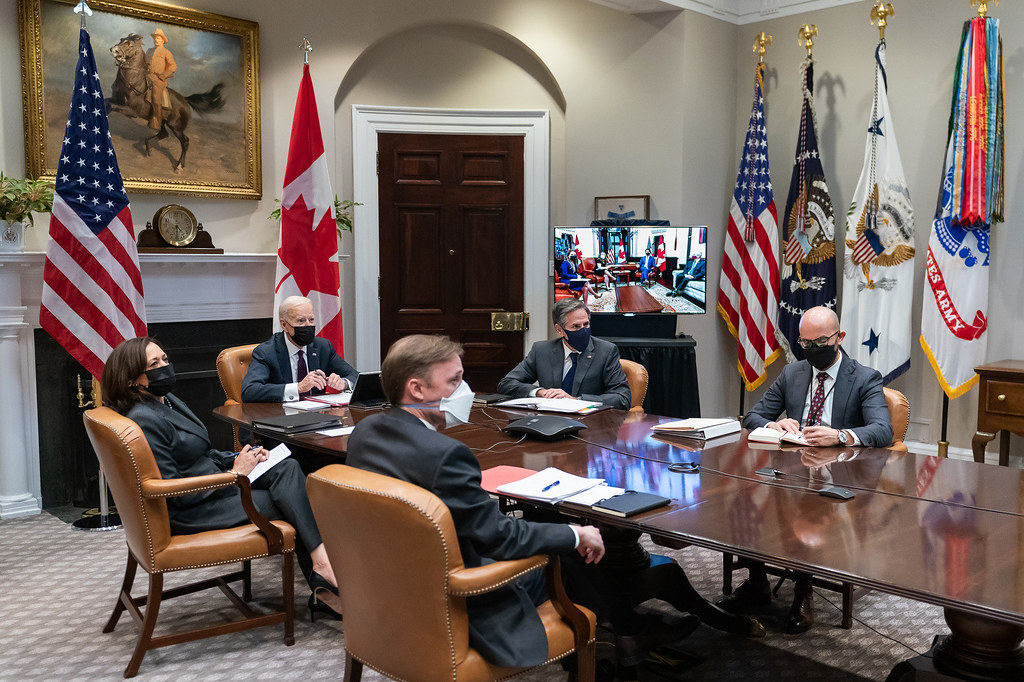
President Biden is running the conventional foreign policy that he promised to run during the campaign and that anyone who has paid any attention to him over the last four decades might have expected. Somehow, Michael Crowley reports for the NYT (“Liberals Grow Impatient With Biden’s Foreign Policy Decisions“), that has folks upset.
Earlier this week, Biden administration officials passed around with bemusement some words of praise from an unexpected source: Jared Kushner.
In an opinion essay for The Wall Street Journal, Mr. Kushner, former President Donald J. Trump’s son-in-law and adviser on Middle East issues, said that President Biden “did the right thing” and had “called Iran’s bluff” by refusing to make new concessions to lure Tehran into talks about restoring a nuclear deal abandoned by the Trump administration.
Mr. Kushner may have meant well, but his seal of approval compounded a problem for Mr. Biden by inflaming liberal allies already disappointed that his nuclear diplomacy with Iran had not made swifter progress.
“I would take this in the Biden White House as a giant, blinking red light that maybe what I’m doing is not right because Jared Kushner is finding ways to praise it,” said Benjamin J. Rhodes, a deputy national security adviser under President Barack Obama who worked closely on the 2015 nuclear agreement, speaking Wednesday on the “Pod Save the World” podcast.
So, look, Kushner is something of a yahoo and not someone from whom I would take advice on Middle East policy. But he, like the rest of us, are viewing this from the outside and projecting his preferences onto what he’s seeing and hearing.
The Biden team’s Iran negotiations have just started. But, as much as he’d like to simply go back to 2016 and reinstate the JCPOA and use that as a baseline, the Trump administration’s withdrawal puts them in a bad spot. Iran quite reasonably has little reason to believe the United States will honor a new agreement beyond Biden’s term. Further, they have all the leverage.
And, yes, Biden is being judged from all sides and will be criticized as “weak” if he’s perceived to have made concessions—which is the only way to get a deal—and as being feckless if he doesn’t. Meanwhile, like President Obama, he has likely boxed himself in politically by publicly expressing hopes that the deal will include issues beyond the nuclear program, like the regime’s support of terrorists and proxies. But it’s not obvious at all what carrot we could offer to make those concessions worthwhile for Iran.
Iran is just one of several foreign policy issues frustrating Mr. Biden’s base two months into his presidency. Although Mr. Biden delighted them with several swift actions — among them rejoining the Paris climate accord and withdrawing support for the Saudi-led war in Yemen — he triggered frustration by ordering an airstrike in Syria and declining to punish the crown prince of Saudi Arabia, Mohammed bin Salman, over the brutal murder of a dissident journalist and American resident, Jamal Khashoggi.
On Wednesday, Mr. Biden fueled the discontent when he conceded in an interview with ABC News that it would be “tough” to meet a May 1 deadline, set under the Trump administration, to withdraw troops from Afghanistan, a high priority for liberals impatient to end what they call “endless” American wars.
And more conflict may lie ahead on military spending, with Mr. Biden expected to propose few if any cuts to a Pentagon budget that swelled under Mr. Trump. Fifty House Democrats sent Mr. Biden a letter this week calling for a “significant” reduction.
After seeing Mr. Biden deliver a transformational $1.9 trillion stimulus bill, progressives are asking why his foreign policy feels so conventional. They worry that Mr. Biden and his largely centrist team of national security officials will disappoint the liberal wing’s desires for a new American foreign policy that relies far less on military power, de-escalates tensions with rivals like Iran and China, and places greater pressure — under threat of cooler relations — on allies like Saudi Arabia and Israel.
They’re disappointed that Bernie Sanders or Elizabeth Warren isn’t President. But “conventional” describes Joe Biden to a T. And, aside from historic efforts to check diversity boxes, his foreign policy team is almost exactly what one would have expected from a third Obama term: well-regarded deputies have moved up a rung or two. People like Tony Blinken, Jake Sullivan, Kath Hicks, and Colin Kahl are part of what Rhodes derisively termed “the Blob”—career professionals who are widely admired by other national security professionals and well within the mainstream in their policy preferences. They’re exactly the kind of people I would have expected Biden to nominate and I’m quite pleased that they’re running the show.
One senior administration official said the Trump era created an unrealistic appetite for finger-snap action on complex issues, and that the longer arc of Mr. Biden’s policies would satisfy many frustrated liberals. The official spoke on condition of anonymity to discuss unofficial political considerations.
The official also pointed to several early actions by Mr. Biden welcomed by the left, including his returning to the climate deal, the World Health Organization and the United Nations Human Rights Council. Mr. Biden also reversed visa restrictions widely known as Mr. Trump’s “Muslim Ban,” announced an end to U.S. support for the Saudi-led military campaign in Yemen and has placed temporary new limits on drone strikes outside of combat zones.
Which, less than two months in, is quite a lot. And, again, exactly what he promised: a restoration of normal order and a cleaning up of the damage caused by Trump.
Some prominent liberals call those moves welcome, but also low-hanging fruit, and say that on matters requiring harder trade-offs and political courage, Mr. Biden is too risk-averse. They worry that a 78-year-old president may recall too keenly the days when Republicans routinely enjoyed a political advantage on national security issues and Democrats gravitated to more conservative, militaristic policies to defend their right flank.
“I think that there is a lack of belief that the politics around some of these issues have actually shifted,” said Jeremy Ben-Ami, president of the Israel-focused, liberal advocacy group J Street. “There is a lot more political space open to this administration to pursue progressive policy than they think.”
First off, Biden never claimed to be a progressive. Indeed, he ran against the progressives and kicked their asses. Beyond that, aside from attitude, it’s not even clear that there is a coherent progressive foreign policy agenda. And, with the glaring exception of immigration policy, it’s actually closer attitudinally to Trump than Biden on trade and defense.
Eventually, the critiques get more substantive:
The Middle East, which Biden officials hope to de-emphasize as they turn America’s attention to China, is the source of many complaints. Topping the list is Mr. Biden’s decision not to unilaterally rejoin the Iran nuclear deal by reversing harsh sanctions imposed on Tehran by Mr. Trump after he abandoned the agreement in 2018.
Iran says it will not talk, much less scale back its advancing nuclear program and comply with the deal’s limits, until Mr. Biden acts.
Supporters of the original deal, including Obama administration officials who helped to design it, say the passage of time only allows for political opposition to build at home and for events in the dangerous region to trigger an escalation.
They also complain that Mr. Biden is maintaining the sanctions Mr. Trump applied on Tehran when he exited the nuclear deal, even though Iran had been in compliance at the time. Mr. Kushner referred to this approvingly as a “strong hand” that Mr. Biden had inherited.
“The Biden administration has bought the Trump analysis that these sanctions give America leverage, even though the sanctions didn’t give Trump any leverage on Iran,” said Joseph Cirincione, a longtime arms control expert who consulted closely with Obama administration officials over the nuclear deal.
Further complicating the prospects for nuclear talks was Mr. Biden’s Feb. 25 airstrike targeting Iranian-backed militia fighters in Syria, a retaliation for militia rocket attacks on U.S. forces in neighboring Iraq. Although the strike was limited, it derailed nascent nuclear diplomacy and risked escalation, Mr. Cirincione said.
Cirincione is an honest broker and well-respected for his expertise but he’s a single-issue guy. While stopping nuclear proliferation is our most important goal with Iran, it’s not our only goal. Certainly, protecting American troops in the region and the security concerns of partners and allies in the region must also be considered.
The strike also angered liberals determined to end what they call America’s “endless” or “forever” wars — its military and counterterrorism campaigns across the Middle East and parts of Africa that began after the attacks of Sept. 11, 2001. Senator Bernie Sanders, an independent of Vermont, said the strike “puts our country on the path of continuing the Forever War instead of ending it,” and he questioned its legal justification. (The White House says it supports congressional action to repeal and replace Bush-era laws that provide presidents with broad authority to use force.)
Frankly, the “legal justification” argument is a dead letter at this point. Presidents have enjoyed the unilateral power to order one-off strikes without specific Congressional authorization for close to three-quarters of a century. And, despite specific language to the contrary, the 1973 War Powers Act has been construed to provide additional blessing.
Beyond that, while I’ve thought it time to get out of Afghanistan since at least 2009 and opposed the Libya and Syria interventions, it’s not clear how a retaliatory strike changes the equation. Until American troops are no longer in the region, though, Presidents are duty-bound to protect them. Punishing those who target them is simply de rigueur.
There are several more paragraphs offering what amount to critiques of the standard US foreign policy of primacy and along the lines of “personnel is policy.” I’m sympathetic to them, especially the former. Sadly, with the possible exception of 2004, foreign policy has not been central to any US Presidential election since the end of the Cold War more than thirty years ago. It would be strange, indeed, to embark on a radically different course without having that debate. And it is stranger, indeed, to expect it to come from Joe Biden.

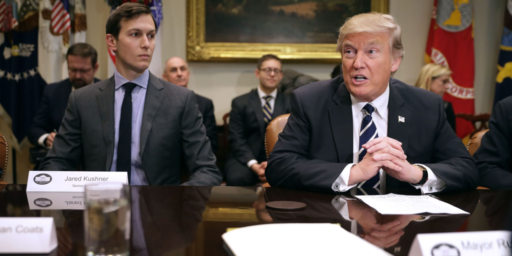
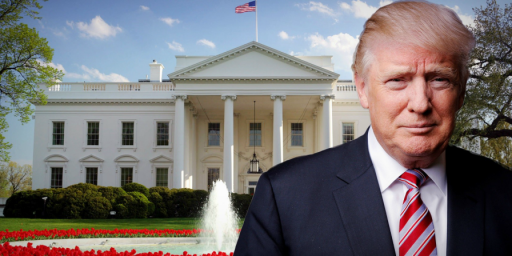
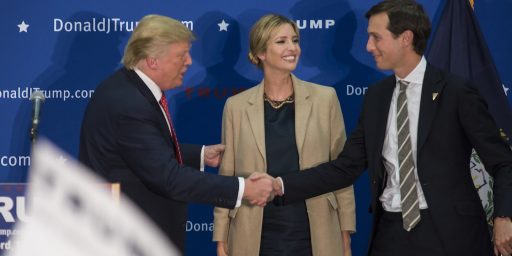

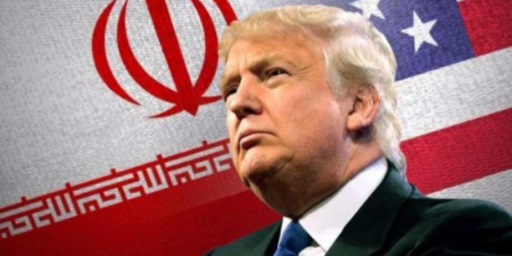
Kushner is a spoiled man child with delusions of competence. Anyone who factors him into their political calculus in any way is calling their own competence into question.
James, I agree with your overall sentiment. Iran, Russia, Nirth Korea, China, these are all difficult problems, so difficult that I’m sure I don’t have the knowledge and experience enough to form an opinion. I’m glad that Biden is selecting competent people.
The NYT article is short on names and full of phrases like “progressives are asking,” “some prominent liberals,” “liberals determined to end what they call America’s ‘endless’ or ‘forever’ wars,” “many liberals complained,” “some Democrats,” etc., etc.
Naturally, we gotta bash the naives hippies on the left in order to bask in our own sense of hard-nosed realism. So the NYT is happy to supply that warm, fuzzy feeling.
But it’s all rather thin, isn’t it?
@drj:
Good point. And a more accurate headline might be, “Like every single President from the first, every interest group or coalition questions Biden’s foreign policies with an ear to their domestic audience, ignoring actual foreign issues.” But that would be hard to fit atop the boilerplate article that ensues
@drj:
I agree that the sourcing is rather thin, although that’s generally the case. Few powerful Democrats are going to go on record bashing a relative popular Democratic President this early in his administration.
I think two, related things are going on. First, there is genuine division between the progressive and moderate wings of the party, although the former really isn’t all that focused on foreign affairs. Second, there’s the phenomenon that Matt Yglesias described years ago of Democrats simply being afraid of being called “weak” on foreign policy, so they bend over backward to protect themselves on that flank.
DEMS IN DISARRAY!
Always a popular, if thin and poorly sourced, headline. Not worth as much time and as many words as you’ve put to it, James. There are differences of preferred foreign policy (and tactics) in the Democratic Party. Shocking.
Yes, we’re only seeing the early manifestations of Biden’s foreign policy. And he’s explained it, but I seem to be the only one who’s reading the documents.
@Cheryl Rofer: I’ve read the interim NSS, the Blinken speech, and especially the stuff coming from Austin and company at Defense. I’ve only skimmed the Carnegie Report, which I don’t consider administration policy.
Unlike you, I see it all as fairly banal. Not in a bad way. As noted above, I see it as well within the elite national security consensus. I just don’t see variations of “foreign policy for the middle class” as particularly revolutionary. Nor do I see prioritizing COVID as particularly noteworthy; any non-Trump President would have done that.
@James Joyner: What I find noteworthy is the consistency of the message across agencies. And actions backing up the policy.
I agree that such documents can be routine and generally ignored, but in the middle of a pandemic, rebuilding after the most destructive presidency ever, it seems useful to compare them with the administration’s actions.
Yes, prioritizing the pandemic and rebuilding relations with allies are no-brainers, but do you think a Republican president other than Trump would have gone in that direction? The fact that it’s a question tells us what we need to know.
It’s “foreign policy for Americans” now. The other formulation got bad reactions, so they changed it. Reading the documents shows an ability to change. Biden’s whole transmittal letter is about change, which has to come if we are to remain a united country.
These are not the usual anodyne documents. Or if they are, we are in as much trouble as we were with Trump.
A funny thing about ideologists and foreign policy, is that when an ideologists is faced with the realities of foreign affairs situation, it is the ideology that crumbles and the once advocate for FP change now an administrator is faced with the task of herding cats and change becomes something that happens on the periphery. When radical change comes to FP, such as the Former Guy’s admin, it usually and did founder and accomplish little. But that does make it difficult for successors.
@Cheryl Rofer:
That’s fair. My sense—and I grant that it’s very, very early—is that what we’re seeing isn’t so much a significantly different policy but a more competently executed one. Biden is the first incoming President since George HW Bush with an interest and expertise in foreign affairs and it shows. Trump was an idiot and an asshole who mostly attracted the same. Obama was very bright and surrounded himself with talent but there wasn’t much of a sense of direction because Obama himself didn’t know what he wanted and the Clinton-Gates-Jones team weren’t on the same sheet of music.
@James Joyner:
That is a pretty fair summary of the last few administrations. Part of the problem with US foreign policy is that only a tiny slice of the population gives a damn, so the people aren’t really pushing things one way or another.
The people just know they don’t like long, complicated, morally ambiguous or costly – four adjectives necessary to all sensible foreign policy. The people like solutions that begin with, ‘Why don’t they just. . .?” because the people couldn’t find Canada on a map of North America, let alone have even the vaguest notion of who’s doing what to whom and for what reason in the middle east. Or Asia. Europe. South America. Africa. Australia. Antarctica.
A people completely ignorant of geography and history – no, really, I do mean completely – have no business opining on FP, and yet, they do, but never in an organized, informed sort of way, but in spasms of sudden interest, generally driven by anger or pity, and followed by a sudden loss of interest.
The goal of the JCPOA is to delay Iran’s quest for nuclear weapons. And then delay again. And again. Forever. The JCPOA is time limited, but there’s always the option of extending it. It’s a good plan, but only while it’s being maintained.
I don’t think that Iran holds all the leverage.
I would like to see Biden give Iran a three month grace period to come back into compliance, as they were in compliance when the US put the sanctions in place. And use those three months to negotiate — do we sweeten the deal by buying the nuclear material they have produced? Maybe.
That’s my only real quibble with the broad outline of Biden’s foreign policy so far.
I would have liked a slap on the wrist for MBS, but I don’t expect anything substantive. I’m pleased we are backing down from supporting the Yemen war, and am hoping it signals a decreasing support for the House of Saud in general.
Biden’s air strike was the smallest option possible to send a message. I’m ok with it.
@James Joyner:
I would submit that the “isn’t all that focused” in the second part of that sentence significantly undermines the “genuine division” in the first part.
Progressive passion in foreign policy stems (generally) from their interest in spending the money now going to endless war on higher priorities and from a worldview that favors diplomacy and broad international coalitions. As Michael notes, geography (let alone delicate geopolitical balancing) doesn’t come into play.
Re:
What leverage are we looking for? We reneged on the agreement unilaterally so what is the issue with reinstating it unilaterally? If Iran fails to abide the sanctions can be always brought back. I can’t picture a demand for a concession from Iran on this issue. However I can see a logic in Biden holding off for the first two months of his administration, due to much more important fish to fry, and the actions of the Shia militias in Iraq made an immediate reinstatement unseemly.
@Gustopher:
What leverage do you think we have?
What’s our leverage, though? Trump put the US sanctions back in place but others didn’t follow suit.
I suppose everybody has their price. But Iran desires a nuclear program for a whole variety of reasons. I just don’t see them giving it up.
@dazedandconfused:
Trump reinstated the US sanctions when he decertified JCPOA. But we can’t unilaterally reimpose the sanctions the Europeans and others were imposing.
@James Joyner:
My understanding is in response to the US’s decertification the EU moved to block the effort to force them to participate in a re-imposing of sanctions.
https://en.wikipedia.org/wiki/Sanctions_against_Iran
It’s unclear to me if that was successful, with the power of the US banking system being the world’s bank being what it is. But from all I’ve heard the EU was struggling to abide the agreements of the Joint Pact. That indicates whatever sanctions the EU is currently holding against Iran are there because we are forcing it, not because they are doing them on their own.
It’s a lesson every smart child learns: your parents have a limit, and if you can take all they can dish out, they’re left powerless. My mother used to flail away with one of her cheap lady’s belts and I just laughed. She wasn’t going to escalate to a baseball bat, so she was done.
We did all we could to Iran short of a military assault. They didn’t break. So now what? Threaten them with our lady belts again?
Have we ever broken anyone with sanctions aside from South Africa? North Korea, USSR, Russia, Iraq, Syria? We’ve had sanctions on Cuba since I was 8 and the Beatles were singing, Love Me, Do. Is Cuba still there? Yep.
Sanctions are a sort of modern take on siege warfare – which also tended not to work.
Opened their program to destruction and strict inspection for the months the JCPOA was in effect was a strong indication Iran isn’t adamant about having a nuclear weapons program. Perhaps because it would give the Saudis an excuse to acquire some, which Pakistan could provide in a heart beat. Pakistan teeters on the brink constantly and Saudi money goes a long way towards preventing them from tipping over the edge, so it would be difficult to say no.
@Sleeping Dog: I’ve always thought it interesting that those who say they’ll be massively different as to foreign policy almost always reign in their plan. It makes me wonder if it’s the more secure information in their briefings, now that they’re responsible for decision-making, that is the cause of that backing-up.
During the election I watched Biden rather closely amidst all the speculation about what Harris’ role might be. Now, I don’t think his health is all that great, and – maybe – he doesn’t have a huge ego, but I had a hard time with really seeing that pairing. I’ve been wondering for months now whether this career politician isn’t dumb like a fox. Obama gave him next to nothing to do, though I presume he also was in a position to have more information than we have. I think he’s learned a lot in his years and I suspect he’s got steel behind his smile. I’m just unsure as to where the steel will be directed.
I thought (much too hubby’s ire) he allowed the party to do and hope as they wished, knowing that he’d have the reins once elected. I wonder if we really know where Biden stands along the liberal continuum on each issue but I’m hoping he’s more a middle-of-the-road liberal, tempered a bit. I’m pretty tired of wide political swings.